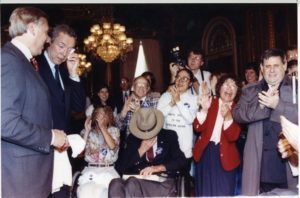
Justin Dart, “Father of the ADA,” Yoshiko Dart, U.S. Rep. Steny Hoyer, Rep. Orrin Hatch, and other advocates react to the Senate’s passage of the Americans with Disabilities Act of 1990 by a vote of 91-6 on July 13, 1990. The Act was signed thirteen days later.
Last week on July 26th we recognized the 31st Anniversary of the Americans with Disabilities Act (ADA). While 31 is not one of the “big” anniversaries ending in five or zero, this year’s turn around the sun seems especially important as a significant number of our communities are hoping to re-open as we transition to another phase of the COVID-19 pandemic. The pandemic has highlighted how many Americans live and work with disabilities, and as we recognize the Anniversary of the ADA this year, we must consider a new cadre of individuals, those with long COVID, that will demand the tools and resources to maintain access and feel included in their communities.
The influence of the COVID-19 pandemic has highlighted the importance of being able to access goods, services, and essential items from the safety of your home. Personal shopping, access to doctors and groceries, and a diverse pool of delivery options have kept many going during the past year and a half. Many of these services are resources for which the disability community had been advocating for years prior to the pandemic and were a game changer for everyone.
This response and access to services has also created a cultural moment in which many Americans now have a better understanding of the benefits of accommodations and the difficulties associated with limited access. After a year of making greater use of services that also support individuals with disabilities and older Americans, the year of quarantine has also led to more open conversations about mental health conditions, substance use, and isolation, to name a few. We must also consider individuals with long-COVID, individuals who were exposed to the virus and still experiencing symptoms and disabilities even after recovery. These people represent a new generation of people with disabilities, and depending on how they define themselves; their presence could mean a new societal approach to disability and inclusion. As we continue to navigate the pandemic, the ADA and its application could be the recipient of new energy as we look to the legislation for guidance on how to create societies that are inclusive of all people.
As we continue to recognize the 31st Anniversary of the ADA, we hope that you join the NAB in celebrating a new year of the ADA and recommit to the work to be done to increase access and connect individuals with the tools and resources to participate fully at home, at work, and in their communities. Let us all become more energized and take action together to make our communities welcoming and accessible places for all people. Working together, we can bring the celebration of the ADA and the values of inclusion and access to all for years to come and continue on the path to an accessible and inclusive future.


